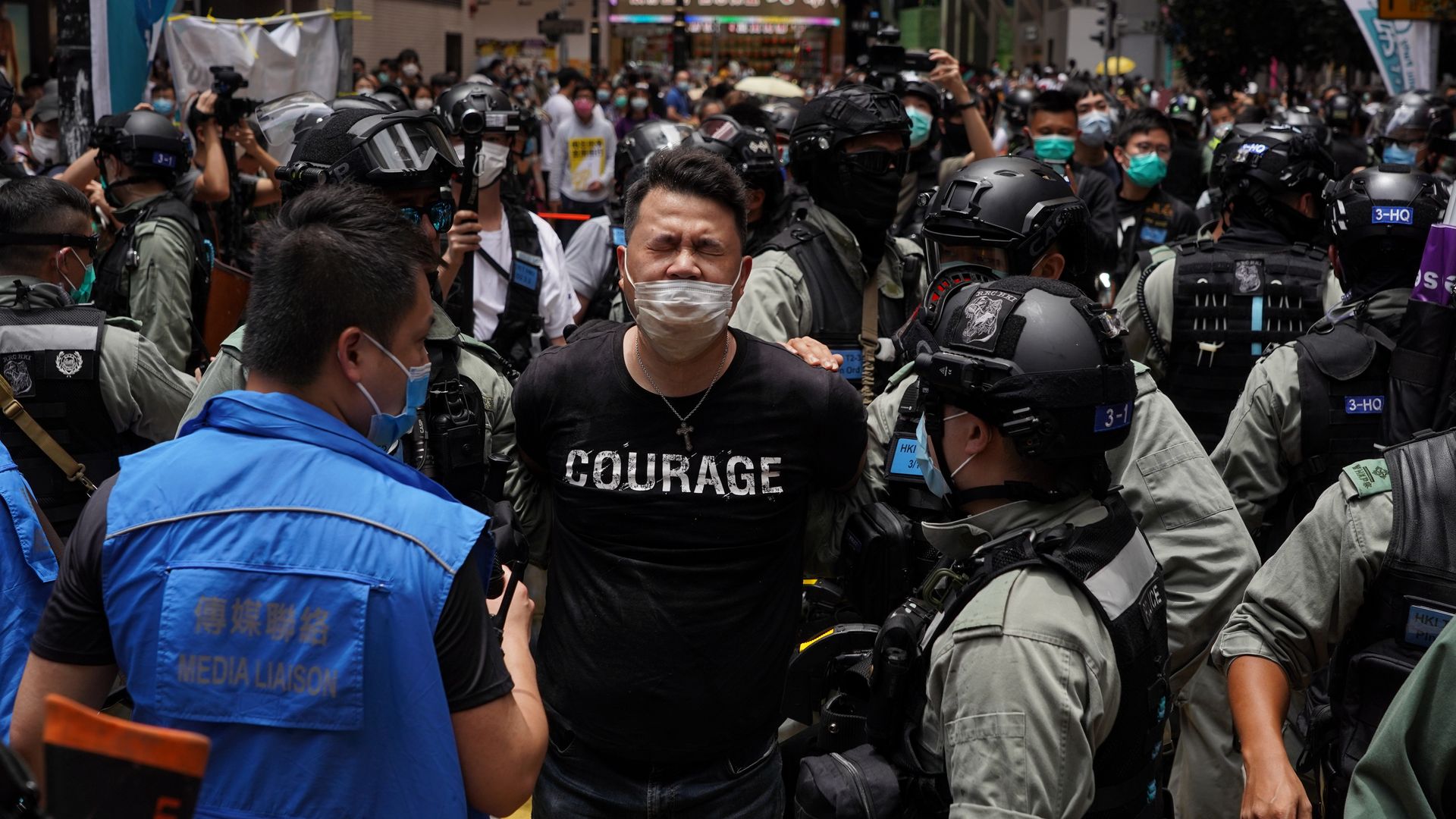Hong Kong's fate is the future of globalism
Add Axios as your preferred source to
see more of our stories on Google.

Andrew Wan, a pro-democracy legislator, is arrested during a protest in Hong Kong, July 1. Photo: Yat Kai Yeung/NurPhoto via Getty Images
A new security law in Hong Kong is the latest blow to a globalist vision of the free movement of people, ideas and capital.
Why it matters: The law all but eliminates the civil rights that people in Hong Kong have exercised for years. But it also points the way to a more dangerous and divided world that will be increasingly defined by borders and nationality.
What's happening: At 11pm local time on June 30, the Chinese government released the details of a security law long in the works that effectively criminalizes pro-democracy protests in Hong Kong. It also gives Beijing wide latitude to treat Hong Kong citizens suspected of security violations with the same draconian approach used in mainland China.
- After thousands took to the streets of Hong Kong to protest the law on July 1 — the 23rd anniversary of the city's transfer to Beijing's control — police arrested more than 300 people, including at least nine over new offenses created by the law.
Between the lines: While Hongkongers will be the first and primary victims of the law, its passage casts doubt on the future of the place that has long branded itself as "Asia's World City."
- If globalization could be said to have a capital, it would have been Hong Kong — or more precisely, its gleaming international airport, used by 71.5 million passengers from around the world last year.
- The city's freewheeling capitalism, and its location geographically inside but politically outside of China, made Hong Kong rich, with its per capita GDP rising from $429 in 1960 to nearly $50,000 in 2018.
- More than that, Hong Kong was a place where East and West could mingle, home to a pungent press, and overseen by an independent judiciary and civil service that was internationally respected for its adherence to the rule of law.
Hong Kong's economic primacy declined after it returned to Beijing's control in 1997 and China itself began to open up to the rest of the world, but Hong Kong's value as a symbol of globalism only increased.
- The hope of many in the West was that China would become more like Hong Kong and that the influence of global capitalism would lead Beijing to become politically more liberal over time.
- This was globalization Hong Kong-style — economic and a growing degree of political freedom, and membership in a near-borderless world.
Yes, but: In truth, that vision only ever applied to a minority of actual Hongkongers, many of whom resented the city's extreme inequality and were all too aware that even under the British, Hong Kong had never been a real democracy.
- These are the people who have taken to the streets off and on for 17 years, dating back to July 1, 2003, when half a million Hongkongers marched in opposition to proposed national security legislation — an early version of the law now being imposed on them.
The big picture: That free Hong Kong seems near death, as does the broader globalist vision the city represented.
- Beijing, far from liberalizing, seems increasingly eager to impose its rules on the rest of the world. That includes the new security law, which explicitly applies beyond Hong Kong's borders and to non-Hong Kong residents, potentially making what was long an open city unsafe to anyone perceived as an enemy of Beijing.
- Growing economic tensions between the U.S. and China have fractured free trade, and even the global internet is increasingly breaking down along national lines.
- International borders that were once porous, like those between EU nations or the U.S. and Canada, have been shut because of the coronavirus, and it's far from clear when they will reopen.
The bottom line: Hong Kong was far from perfect and it was far from fully free. But at its best, it represented a hope for a brighter, more global future — a vision now dimmed by the old forces of nationalism and disease.
